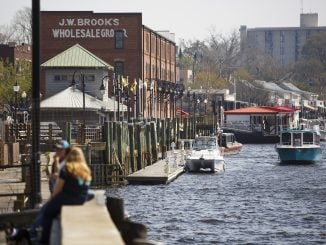
RALEIGH — A federal investigation is underway into the Department of Environmental Quality and the release of the chemical GenX into the Cape Fear River from the Chemours plant in eastern N.C. The U.S. Attorney’s Office for the Eastern District of North Carolina issued a criminal subpoena to N.C. DEQ requiring permits, emails, notes, compliance information and any other pertinent reports be turned over to a grand jury by Aug. 22.
“DEQ will provide all relevant records about Chemours as part of this ongoing federal investigation,” said DEQ spokesman Jamie Kritzer in a statement. “We are pleased that federal authorities are taking this matter seriously as we continue our own investigation into Chemours and the issues surrounding GenX and the other unregulated chemical compounds.”
The investigation came after it was discovered that the Chemours Fayetteville Works plant, 75 miles northwest of Wilmington, was releasing GenX, a fluorinated chemical, into the Cape Fear River as a byproduct of producing nonstick coating.
Chemours said the chemical has been released for 37 years and has a federal consent order in place that exempted the chemical when it was produced as a byproduct, meaning that the government knew GenX was being released, but GenX is not listed on their permit. Under the Clean Water Act, the state is required to intervene in cases where companies release chemicals they believe to be toxic, even if there are no Environmental Protection Agency standards for them.
The grand jury collecting information about how this happened and who is culpable is convening in Wilmington, a community struggling to make sense of it all.
Last week the Cape Fear Public Utility Authority said it will file a lawsuit against Chemours and DuPont on behalf of the residents using the Cape Fear River as their primary drinking-water source. In a letter to the EPA, the U.S. Attorney’s office, Chemours and DuPont, CFPUA said that DuPont and Chemours are “contributing to the past or present handling, storage, treatment, transportation or disposal of hazardous waste which may present an imminent and substantial endangerment to health and the environment.”
On Monday, CFPUA also announced that it will remove 48 million gallons of treated drinking water stored in the Peedee aquifer, saying that it still tested at 140 parts per trillion (ppt) for GenX, which is below the goal of the N.C. Department of Health and Human Services, but more than the utility usually sees.
“Because the water was treated and stored while Chemours was still discharging GenX into the Cape Fear River, CFPUA has decided it is in the best interest of our customers to withdraw that water from the aquifer,” the utility said.
CFPUA will start withdrawing the water in September, discharging to the sewer system and into the river downstream of drinking water intakes.
Gov. Roy Cooper issued a statement directing a state science panel to assess the community health impact of GenX and asked the State Bureau of Investigation to determine if a criminal investigation is warranted. However, while federal and state officials meet and study, residents of Wilmington and surrounding counties say they still are worried about the day-to-day safety of their water and their families.
If customers want water from an alternate source, CFPUA is offering free filtered water from a ground source. Three area churches — Warner Temple AME Zion Church, St. Phillip AME Church and Ephesus SDA Church — are providing volunteers to get water to families that request it. Since July 31, volunteers have been transporting empty containers to Ogden Park where they are filled with treated groundwater at no cost. Church volunteers then bring the filled containers back to the designated churches where customers can pick them up.



